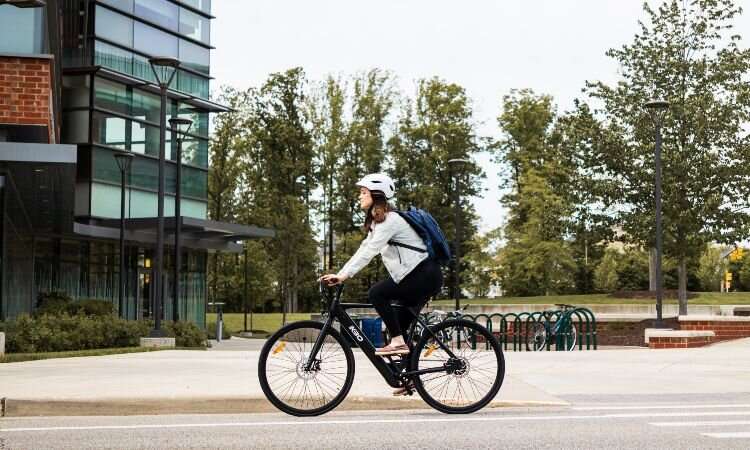Report: Reframing active travel planning is key to creating more cycling and walking-friendly towns and cities

Reframing local authority and national planning measures that redistribute car-centric travel spaces to prioritize walking and cycling is critical to help Ireland work towards its goal of halving transport sector emissions by 2030 to meet international decarbonization targets, according to new research.
Researchers from Trinity College Dublin’s Center for Transport Research analyzed a sample of 150 public consultation submissions opposing redistributive active travel measures put forward as part of an “Active School Travel” scheme in Dún Laoghaire-Rathdown. They found that opposition to active travel measures that prioritize walking and cycling often draws upon underlying beliefs that are incompatible with national policies to increase daily active travel journeys by 50% by 2030 in pursuit of transport decarbonization targets.
This included assumptions that cycling mobility does not qualify as legitimate “traffic”; that cycle spaces are not part of a broader transport or “traffic” system; that cycling is implausible as a mode for shopping or as a mode of mobility in rainy conditions; and that car traffic fundamentally will not and cannot be reduced with active travel measures that make walking and cycling relatively more accessible.
The authors suggest several important recommendations for how future active travel planning proposals could be communicated, including:
- Wording cyclists/cycling as “cycle traffic” rather than something potentially “in the way” of traffic or as a “cause” of traffic.
- Quantifying the effects that car-centric planning can have on the safety of people walking and cycling, and on local air pollution.
- Underlining why car-centric transport is unsustainable from an everyday mobility perspective in light of population growth and national policies aiming to promote more compact urban development.
- Communicating the major dependencies of mass driving, such as road spaces, parking spaces, driver licensing, car insurance, affordable fuel prices, and fueling stations.
Dr. Robert Egan, Postdoctoral Research Fellow from Trinity’s Center for Transport Research and School of Engineering, co-authored the synthesis report. He said, “Cycling is first and foremost a practical mode of transport that can—with the right conditions—be used for a variety of everyday tasks by a wide variety of people. However, public spaces need to be developed in such a way that makes cycling –as part of a multi-modal system—more accessible than driving, at least in urban areas for shorter journeys—many of which are still undertaken using the car.
“Decades of investment in a car system has pushed cycling and walking to the margins, but now we need to radically change these spaces to support multi-modal travel, of which walking and cycling play an important role. In this research, we have identified how underlying assumptions around transport planning and everyday mobility practices can lock-in planning practices the continue to prioritize the car. These assumptions are incompatible with national decarbonization targets for the transport sector.
“On these grounds, we propose several recommendations for framing active travel planning measures—with a focus on cycling—that firmly position these measures as genuine, plausible and critical transport interventions rather than discretionary additions to an existing car system. A transport system that continues to prioritize the car in towns and cities is no longer sustainable from a climate perspective but also from the perspective of everyday urban mobility in light of population growth and policy goals for increased compact development.”
Professor Brian Caulfield, from Trinity’s Center for Transport Research and School of Engineering, co-authored the synthesis report. He added, “The climate action plan requires a 50% increase in daily active travel trips in order to meet our transport emissions targets. However, across Ireland many cities and towns are struggling to construct the infrastructure required to enable this target. Our research demonstrates how local authorities can improve their means of stakeholder engagement and consultation in order to expedite the delivery of these projects.”
Professor Siobhán Clarke, Director of the SFI Enable Program, which is hosted by the SFI CONNECT Research Center added, “This research is an important component of Enable’s smart mobility theme, where our research on the IoT, data analytics and citizen engagement interact to contribute to solutions to current global challenges with robust, resilient Intelligent Transportation Systems that are inclusive and sustainable.”
More information:
The synthesis report can be downloaded at www.tara.tcd.ie/handle/2262/102927
Citation:
Report: Reframing active travel planning is key to creating more cycling and walking-friendly towns and cities (2023, June 22)
retrieved 22 June 2023
from https://techxplore.com/news/2023-06-reframing-key-walking-friendly-towns-cities.html
This document is subject to copyright. Apart from any fair dealing for the purpose of private study or research, no
part may be reproduced without the written permission. The content is provided for information purposes only.
For all the latest Technology News Click Here
For the latest news and updates, follow us on Google News.
